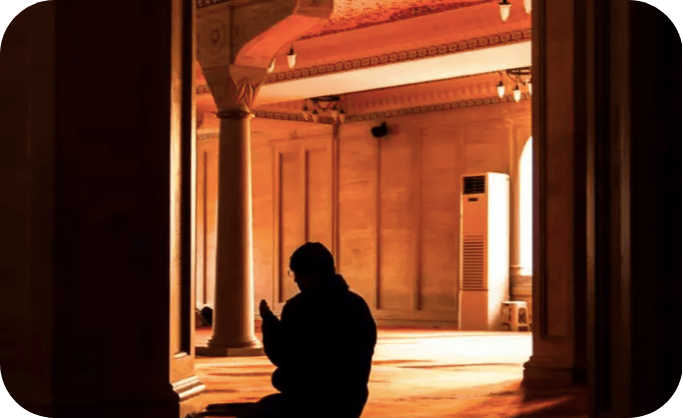The Sacred Moments: Discovering the Best Time to Make Dua
The Sacred Moments: Discovering the Best Time to Make Dua

In Islam, Dua (supplication) is a thread that binds the believer to the divine. It is a moment of profound connection, a sacred dialogue between the worshipper and Allah.
In the tapestry of time, these moments stand out as golden threads, weaving together the fabric of a Muslim's spiritual journey. The best time to make dua is not confined to a specific hour on the clock but extends to the heart's sincere intention and the soul's genuine connection with the divine. Every dua is a testament to the unwavering faith of a believer and the boundless mercy of Allah.
The Impact of making Dua at the Right Time
Certain moments throughout the day carry a heightened sense of spiritual connection, enabling the supplicant to establish a stronger bond with Allah. When we align our duas with these opportune moments, we tap into the divine energy surrounding us and strengthen our spiritual connection.
The right time for dua allows believers to amplify the power of their intentions and experience a greater sense of peace and tranquility. It is during these moments that the heart and mind are most receptive to the blessings and guidance of Allah, paving the way for a deeper connection with the divine.
9 best times to make dua
While dua can be made at any time and in any place, there are moments and situations considered especially auspicious in Islam:
1. The Last Third Of The Night
This night, the majority of creation is peacefully asleep, yet a true worshipper is awake, passionately praying to Allah (SWT) and making dua. Actually, Allah descends to the lowest of the heavens and grants Him access to the realms of mercy and forgiveness.
The prophet Muhamed (ﷺ) said: "In the last third of every night Allah descends to the lowest heaven and says; "Who is calling Me, so that I may answer him? Who is asking Me so that may I grant him? Who is seeking forgiveness from Me so that I may forgive him?."
(Sahih al-Bukhari, Hadith Qudsi)
2. Late at night
When people are sleeping and busy with worldly pleasures, Allah (SWT) gives the believers an opportunity, or an answer hour if they can fight sleep and invoke Allah (SWT) for whatever they need.
The Prophet (ﷺ) said: “There is at night an hour, no Muslim happens to be asking Allah any matter of this world or the Hereafter, except that he will be given it, and this (occurs) every night.”
(Muslim, 757)
Making effective Dua requires a peaceful and clean place to pray and get closer to Allah, create your own calm environment with aromatic candles that you can find at Riwaya
3. Dua between the Adhan and Iqamah
This is one of the best times for the prayer to be accepted, and yet, many of us don’t take advantage of it. Five times every day, while you’re waiting to pray, make dua. Between the adhan and iqamah, you are given the opportunity to make Dua, and ask Allah whatever you want in this Dunya and Akhirah.
The Prophet (ﷺ) said ” A dua offered between the adhan and iqamah is not rejected. Therefore, offer your dua’s (at this time).”
(Abu Dawud, 521)
4. An Hour On Friday
Some have said that this hour is from the time the Imam enters the mosque on Friday’s prayer until the prayer is over (ie between the two khutbahs), whereas others have said that it is the last hour of the day (ie after the Asr prayer until the Maghrib prayer).
The Prophet (ﷺ) talked about Friday and said: “There is an hour on Friday and if a Muslim gets it while offering Salat (prayer) and asks something from Allah (SWT), then Allah (SWT) will definitely meet his demand.”(Sahih al-Bukhari)
5. While Drinking Zamzam Water
-
Zamzam is the name of a famous well that is in Makkah. It is the well of Ismail, son of Prophet Ibrahim (PBUH), from which Allah quenched the thirst of Ismail when he was an infant
The Prophet (ﷺ)said: “The water of ZamZam is for whatever it has been drunk for.”(Ahmed (3/357),
This means that when you drink Zamzam water you may ask Allah (SWT) for anything you like to gain or benefit from this water such as healing from illness…
6. When Waking Up at Night
The Prophet (ﷺ) said: “Whoever wakes up at night and says La ilaha illallahu wahdahu la shrika lahu lahulmulku, wa lahul hamdu, wa huwa ala kulli shai'in qadir. Alhamdu lillahi, wa subhanallahi wa la ilaha illallah, wallahu akbar, wa la hawla wala quwwata illa billah he will be responded to and if he makes ablution and performs Salat (prayer), his Salat (prayer) will be accepted.”(Sahih al-Bukhari)
7. At The End Of The Obligatory Salat
-
This time is after saying 'At-tahyat' , and before making Tasleem (finishing prayer)
The Prophet (ﷺ) was asked, O Messenger of Allah, which supplication is heard (by Allah (SWT), he said “the end of the night and at the end of the obligatory Salat (prayer)”(at-Tirmidhi).
Muslims generally do their dua directly after their prayer while they are still kneeling on their mats, because of the proximity to Allah, where Muslims believe that after completing their obligatory prayers, they are in a state of nearness to Allah.
“The nearest a servant comes to his Lord is when he is prostrating himself, so make supplication in this state” (Saheeh Bukhari).
Check Riwaya’s convenient prayer mat
8. The Night Of Qadr
-
This night is the greatest night of the year. This is the night which the almighty Allah (SWT) said about it,
"The night of Al-Qadar (Decree) is better than a thousand months."(Surah al-Qadr, verse 3)
The Night of Decree is one of the odd nights of the last ten nights of the blessed month of Ramadan. The angels descend down to the earth, and the earth is overwhelmed with peace and serenity until the break of dawn and when the doors of Paradise are opened, the worshipper is encouraged to turn to Allah to ask for his needs for this world and the Hereafter.
9. During The Rain and At the Adhan
The Prophet (ﷺ) said: "Two will not be rejected, Supplication when the Adhan is being called, and at the time of the rain".
(Al-Hakim 2: 114, and Abu Dawud, 2540)
“Seek the response to your duas when the armies meet, and the prayer is called, and when rain falls”
(Imam al-Shafi' in al-Umm, al-Sahihah, 1469).
The time of the rain is a time of mercy from Allah (SWT) so, one should take advantage of this time when Allah (SWT) is having mercy on His slaves.
In another hadith; “When the prayer is called, the doors of the skies are opened, and the du'a is answered”
(al-Tayalisi in his Musnad #2106, al-Sahihah #1413)
Become a Seller with Riwaya
Are you an aspiring entrepreneur struggling to find the right platform for your Islamic products? Look no further. Riwaya is your solution for more blessings in your money.
With Riwaya, you get access to a vast, engaged community of Muslim consumers actively seeking products like yours, by joining us, you tap into a network that bridges the gap between Islamic product sellers and the thriving global Muslim community.
Plus, our platform offers fantastic features and tools to enhance your sales experience, ensuring your products receive the attention they deserve. Become a seller with Riwaya today and let your products find their perfect audience effortlessly."
FAQ
Q1: Why could Allah reject my dua?
Our dua is rejected because we often forget to remember Allah during times of happiness, we should pray consistently in good and bad times, avoid being hasty in seeking a response, and refrain from earning and consuming haram wealth.
Q2: Can you make dua at any time of the day?
Make dua whenever you want, don't let anything prevent you from doing a legitimate worship. It's not required after every prayer but it's not wrong either.
Q3: Is it bad to make too much dua?
If our Lord has promised us that He will respond to our dua, then we should strive to make as much dua as we can! The Companions of the Prophet (peace be upon him) made it a habit to regularly make dua to Allah. They would make dua for even the smallest things.
Q4: Which dua to recite 100 times?
Abu Huraira (RA) narrated: Allah's Messenger (ﷺ) said, “Whoever says, Subhan Allah wa bihamdihi,' one hundred times a day, will be forgiven all his sins even if they were as much as the foam of the sea.”
(Al-Bukhari and Muslim).



